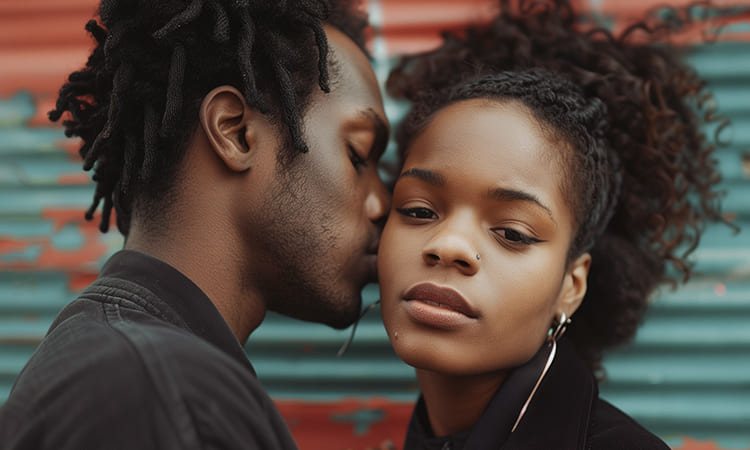Ah, the third date. It’s a phase in the dating game that often feels charged with a unique kind of pressure.
The first date is the nervous introduction, the ‘are we even remotely compatible?’ stage.
The second date is the follow-up, confirming there was enough spark for a second look. But the third date?
That’s often where the narrative shifts. It’s whispered about in hushed tones, weighted with expectations of deeper connection, potential future, and let’s be honest, often, physical intimacy.

As a psychologist who has guided countless individuals through the labyrinth of modern dating, I see the third date not as a test to pass, but as an opportunity.
An opportunity to move beyond the curated first impression and the slightly more relaxed second, towards seeing if there’s fertile ground for something more meaningful to grow.
It’s less about rigid ‘rules’ and more about mindful navigation.
Forget the panicked Google searches for “What are the third date rules?!” Instead, let’s reframe this milestone.
Think of the first two dates as the cover letter and a preliminary interview.
The third date is the chance to step into the office, meet a few more people (figuratively speaking), and see if you can actually imagine spending your days there.
It’s about observing, sharing, and listening – to your date and, perhaps more importantly, to yourself.
So, what are the insights and navigation tips for this pivotal encounter? Let’s delve in.
The Psychological Shift: Deeper Waters Ahead
The most significant difference between the third date and its predecessors lies in the potential for depth.
By now, you’ve covered the basics: jobs, hobbies, travel stories. The third date is your chance to explore values, perspectives, and emotional connection.
This means the conversation should ideally move beyond surface-level facts.
What are their dreams? What challenges have shaped them? What do they care deeply about?
Listen not just to the words, but to the underlying emotions and the why behind what they share.
This is where you start to see compatibility not just in shared interests, but in shared values and emotional intelligence.
Choosing the Canvas: Setting the Stage for Authenticity
The where of the third date can significantly impact the how of the interaction.
While dinner and drinks are fine, consider activities that allow for both conversation and observation in different contexts.
A museum visit allows for shared reactions and quiet conversation.
A cooking class or pottery workshop requires collaboration and reveals how they handle instruction or minor challenges.
A walk in nature provides a relaxed backdrop for personal sharing.
The key is to choose something that feels comfortable for both of you but also allows for glimpses into their personality beyond a seated conversation.
Can they be present? Are they patient? Do they engage with the world around them?
The Art of Gentle Probing and Vulnerability
Sharing more personal aspects of yourself can feel daunting, but it’s crucial for building intimacy (non-physical).
This doesn’t mean oversharing traumas or pouring out your entire life story. It means offering genuine thoughts, feelings, or experiences that reveal more of your inner world.
For example, instead of just saying “I like hiking,” you might share why you love it – “Hiking clears my head; it’s where I feel most grounded” – opening a window into your need for calm or connection with nature.
Encourage your date to do the same, not through interrogation, but through open-ended questions and active listening.
Show genuine curiosity about their feelings and perspectives. This mutual gentle probing and sharing of vulnerability is a cornerstone for building emotional intimacy.
Navigating the Elephant: Expectations Around Physical Intimacy
Let’s address the unspoken pressure that sometimes hangs in the air around the third date: the expectation of sex.
Culturally, the “three-date rule” has often included this element.
However, it is absolutely vital to understand that physical intimacy on the third date is not a requirement or an obligation.
Your comfort level and your date’s comfort level are the only factors that matter here.
A skilled and respectful individual will prioritize your comfort and consent above any arbitrary dating ‘rule’.
Use this date (or the conversation leading up to it) as an opportunity to gauge boundaries and communication around physical touch.
Are they respectful when you set a boundary? Do they initiate physical contact in a way that feels comfortable to you?
Have they communicated their desires or preferences clearly and respectfully?
This isn’t just about whether or not you become physically intimate; it’s about observing how they handle this potentially sensitive area.
Their approach tells you a lot about their respect for you and their communication style.
If you feel ready and want to explore physical intimacy, ensure it’s enthusiastic and consensual on both sides. If you don’t, that’s perfectly okay and should be respectfully accepted.
Your decision should be based on your feelings and comfort, not on societal pressure or a perceived ‘rule’.
As Maya Angelou wisely put it:
“When someone shows you who they are, believe them the first time.”
This applies to all aspects of the third date, including how they handle expectations and boundaries.
Listening Beyond Words: Intuition and Observation
While conversation is key, the third date is also a prime opportunity to sharpen your observational skills and tune into your intuition.
How do they treat staff at the venue? Are they present with you, or constantly checking their phone? Do their words match their body language?
Do you feel relaxed and able to be yourself around them? Do you feel energized or drained after spending time with them?
Your gut feeling is a powerful, often overlooked, source of information. Pay attention to those subtle cues and feelings.
They can provide valuable insights into compatibility that words alone cannot.
Third Date Tips
Like it’s been mentioned, a third date is a milestone, but this usually means there is more pressure placed upon it than other dates. Here are some tips on having a great third date:
Activity
Opt for an activity that allows ample time for conversation, fostering a deeper connection, but also something that the both of you will enjoy as by now, you should have an idea of what your partner likes.
Ask thought provoking, deep questions
Like it’s been mentioned above, use this opportunity to discuss crucial topics and ensure compatibility on important issues.
Lower the pressure
Avoid building excessive pressure around the third date; instead, view it as just another step in the journey. If it works out- great, but if it doesn’t you can always start again.
Be yourself
Authenticity is key; resist the urge to pretend and let the other person see the real you, if you don’t start now, when will you?
Sex
It should be noted that having sex on the third date is not a rule, don’t be discouraged if it doesn’t happen. If intimacy is on the table, have open and honest discussions about boundaries, consent, and health.
The third date serves as a valuable checkpoint in any relationship, offering a glimpse into compatibility, shared values, and potential long-term prospects.
While the third date rule may be debated, the importance of this stage in relationship development cannot be understated.
Ultimately, individuals should prioritize open communication, honesty, and a genuine connection as they navigate the unique dynamics of their own romantic journey.
Remember, dating rules may offer guidance, but what truly matters is what works for the individuals involved.

The Post-Game Reflection: What Did YOU Learn?
After the third date, take some time for self-reflection. Don’t just analyze their every word and action.
Consider your own experience:
- Did you enjoy yourself?
- Did you feel comfortable and safe?
- Did you feel seen and heard?
- Did they reveal aspects of themselves that align with what you’re looking for?
- Did you feel able to be authentic?
The third date isn’t just about evaluating the other person; it’s about evaluating the dynamic between you and how you feel in their presence.
If the connection feels genuine, respectful, and exciting (or calmly comfortable, depending on what you value), then a fourth date might be in order. If something feels off, trust that feeling.
Conclusion: It’s About Potential, Not Proof
The third date is a beautiful opportunity to explore the potential of a deeper connection.
Release the pressure of rigid ‘rules’ and focus instead on authenticity, genuine curiosity, and mindful observation.
Use this time to share more of yourself, listen deeply to your date, and pay attention to the subtle signals your intuition is sending you.
Ultimately, successful relationships are built on mutual respect, understanding, and genuine connection, not on checkboxes ticked by a certain date.
Approach the third date with an open heart and a curious mind, and see where the journey takes you.
It’s not a finish line; it’s a fork in the road, and you get to decide which path feels right for you.

The Nuances of Modern Relationships: Friends with Benefits vs. Fuck Buddies

You’re Dating or Just Hanging Out: 8 Ways to Tell the Difference
Frequently Asked Questions About the Third Date
This notion is entirely false. The only expectations for a date are mutual respect, personal comfort, and consent.
Intimacy decisions should be driven by personal desire, not external or unwritten pressures.
A considerate partner will prioritize your feelings and boundaries over any imagined dating milestones.
Physical intimacy should only happen when you genuinely desire it and feel safe and comfortable.
A successful third date fosters deeper connection and shared experiences. Choose activities that encourage conversation and mutual understanding.
Excellent options include:
Cultural outings: Visiting a museum or art gallery provides ample opportunities for discussion.
Exploration: Discovering a new neighborhood together can be spontaneous and enjoyable.
Relaxed entertainment: Attending a casual live music event offers a blend of engagement and interaction.
Shared activities: A cooking class or hike (if you both enjoy it) can create a sense of camaraderie.
Intimate setting (if comfortable): Cooking together at home can be a cozy and revealing experience.
The goal is to select an activity that promotes interaction and allows you to learn more about each other. Avoid places that are too noisy for conversation or activities that limit interaction.
Keep an eye on their actions and communication after the date. Key indicators of continued interest include:
Expressing enjoyment: Do they reach out to say they had a good time?
Proposing future plans: Do they mention seeing you again or suggest ideas for a fourth date
Responsive communication: Are they attentive and interactive when you converse?
Initiation: Are they initiating contact as well, or are you always the one reaching out?
Proactive behavior and consistent communication are usually reliable signs.
However, remember to check in with yourself. How interested are you? Balance is crucial for a thriving relationship.
There is no set timeline. A key factor involves open communication and finding a suitable date when both parties feel ready and are available.
Waiting a few days to a week after the second date is a common timeframe, allowing for anticipation to build.
Focus on maintaining steady communication and a manageable pace, rather than being driven by arbitrary deadlines.




